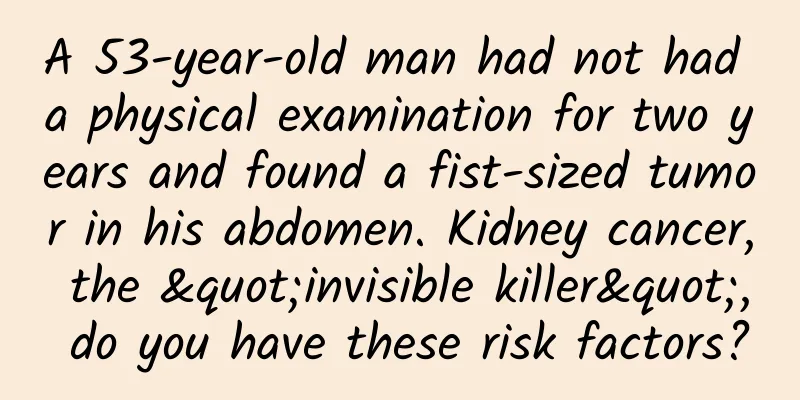A 53-year-old man had not had a physical examination for two years and found a fist-sized tumor in his abdomen. Kidney cancer, the "invisible killer", do you have these risk factors?

|
A month ago, Mr. Wang, 53, found that he had dull pain in his left waist and abdomen and was getting thinner and thinner. At first, he thought it was just caused by fatigue and did not pay enough attention to it. His family advised him to go for a physical examination. The chief physician discovered that Mr. Wang had a fist-sized mass on the left side of his abdomen that was relatively hard and immobile. The results of an abdominal ultrasound were even more difficult for him to accept. It turned out that he had a huge tumor in his left kidney, and it was most likely a malignant tumor. Logically, if he had a physical examination every year, kidney tumors should have been discovered early. After careful questioning, it turned out that he had not participated in the health examination organized by his company for two consecutive years. He felt good about himself, and smoking and drinking were commonplace... The attending physician suggested that he be admitted to the hospital for further examination and treatment. The pathological results after the operation finally confirmed that he was suffering from "kidney cancer" and required further drug treatment. 1. What are the basic functions of the kidneys? The kidneys produce urine to remove metabolic products and certain wastes and poisons from the body, regulate water and electrolyte balance and maintain acid-base balance, and also have endocrine functions. These functions of the kidneys ensure the stability of the body's internal environment and enable metabolism to proceed normally. 2. The kidneys are so important, can they get cancer? meeting. Kidney cancer is a malignant tumor that occurs in the renal parenchymal cells, also known as renal cell carcinoma; it accounts for 80%-85% of kidney tumors; the male to female incidence ratio is about 2:1; the peak age of onset is over 50 years old. 3. What are the risk factors for kidney cancer? Risk factors that may increase your risk of kidney cancer include: 1. Chronic kidney disease 2. Family history of kidney cancer 3. Hypertension 4. Obesity 5. Smoking 4. Kidney cancer is hereditary There is a type of kidney cancer called hereditary kidney cancer, which accounts for 2%-4% of the total number of kidney cancers. It includes VHL disease, tuberous sclerosis, BHD syndrome, hereditary leiomyomatosis and renal cell carcinoma syndrome-related kidney cancer, hereditary papillary renal cell carcinoma, etc., all of which have specific gene abnormal mutations. Compared with hereditary renal cancer, the most common renal cancer in clinical practice is renal cancer caused by non-genetic factors. 5. Are there any early symptoms of kidney cancer? "Kidney" is very important, early diagnosis of kidney cancer is the key 1. The treatment and prognosis of renal cancer are significantly related to its pathological type and tumor stage. Patients with early renal cancer have a better prognosis. Ultrasound is the preferred method for initial screening of renal cancer. 2. Surgery is the main way to treat early kidney cancer. The earlier kidney cancer is found through physical examination, the lower the risk of surgery, the greater the chance of preserving the kidney and its function, and the better the treatment effect. 3. There are almost no symptoms in the early stage of kidney cancer. When the classic kidney cancer shows the "triad": When hematuria, low back pain and lumps appear, it is often already in the middle or late stages of the disease. 6. Is there any way to treat mid- to late-stage kidney cancer? Advanced renal cancer is prone to metastasis from lymph nodes and blood vessels to the lungs, liver, bones and other organs, and the prognosis is poor. However, in recent years, with the approval of molecular targeted drugs and immune drugs for renal cancer, a new era of renal cancer treatment has begun. Currently, targeted drug treatments for kidney cancer can be divided into three types: 1. Drug treatment for advanced renal cancer: If the patient has advanced renal cancer that is not treatable, targeted drugs will be used for treatment. 2. Auxiliary drug therapy: Patients with early renal cancer use maintenance drug therapy after surgery. 3. Neoadjuvant therapy: Patients with inoperable renal cancer receive medication before surgery to shrink the tumor to the point where it can be removed. 7. How to prevent kidney cancer? 1. Kidney cancer, like other kidney diseases, advocates "early detection, early diagnosis, and early treatment" to obtain the greatest benefit. Early diagnosis of kidney cancer is very important. For people at high risk of kidney cancer, regular physical examinations are recommended. 2. In addition, strengthening exercise, controlling blood pressure, controlling weight, quitting smoking and drinking less, and developing a healthy lifestyle are also important measures to prevent kidney cancer. Once abnormal problems are found in the kidneys, you must go to a specialist for treatment in time and actively treat them. The second Thursday of March every year is World Kidney Day, which aims to raise awareness of chronic kidney disease, cultivate healthy living habits, and prevent and treat kidney disease at an early stage. |
<<: Can you make tea with dried grapefruit peel? What are the uses of dried grapefruit peel?
>>: Excessive napping is a sign of dementia? More than 1 hour increases the risk by 40%
Recommend
What is your pulse like during pregnancy?
In a regular TCM clinic, you can see many people ...
Chickenpox: A "close encounter" with the virus
Parents will always face various challenges and t...
What is the matter with the old rotten roots of Luoyang Red? How to deal with the rotten roots of Luoyang Red to save it
Luoyang Red is a common flower plant in life. It ...
Can I eat figs during menstruation?
Speaking of figs, everyone is familiar with them ...
How to relieve morning sickness and nausea
What should I do if morning sickness makes me fee...
What is the cause of bleeding 3 months after delivery?
Postpartum hemorrhage is a common and normal thin...
What to do if urination hurts
There is a stinging sensation when urinating, but...
What should I do if my girlfriend has triple positive?
Liver disease is a disease that has a very big im...
Women can protect their heart and skin by eating more red food
In our Chinese medicine diet therapy, we attach g...
Women's ovulation response
Women in their ovulation period will experience m...
What are the ways to lose weight during menstruation?
Every woman will have menstruation. Menstruation ...
What are the early symptoms of uterine infertility?
Every disease has early or late symptoms. If it i...
What should women do if they urinate frequently after drinking water?
Generally speaking, the amount of urine will incr...
What is the red light of cervical erosion?
Cervical erosion is a very common gynecological d...
What does it mean when a woman doesn’t reply to your message?
We all know that in the process of communication ...









